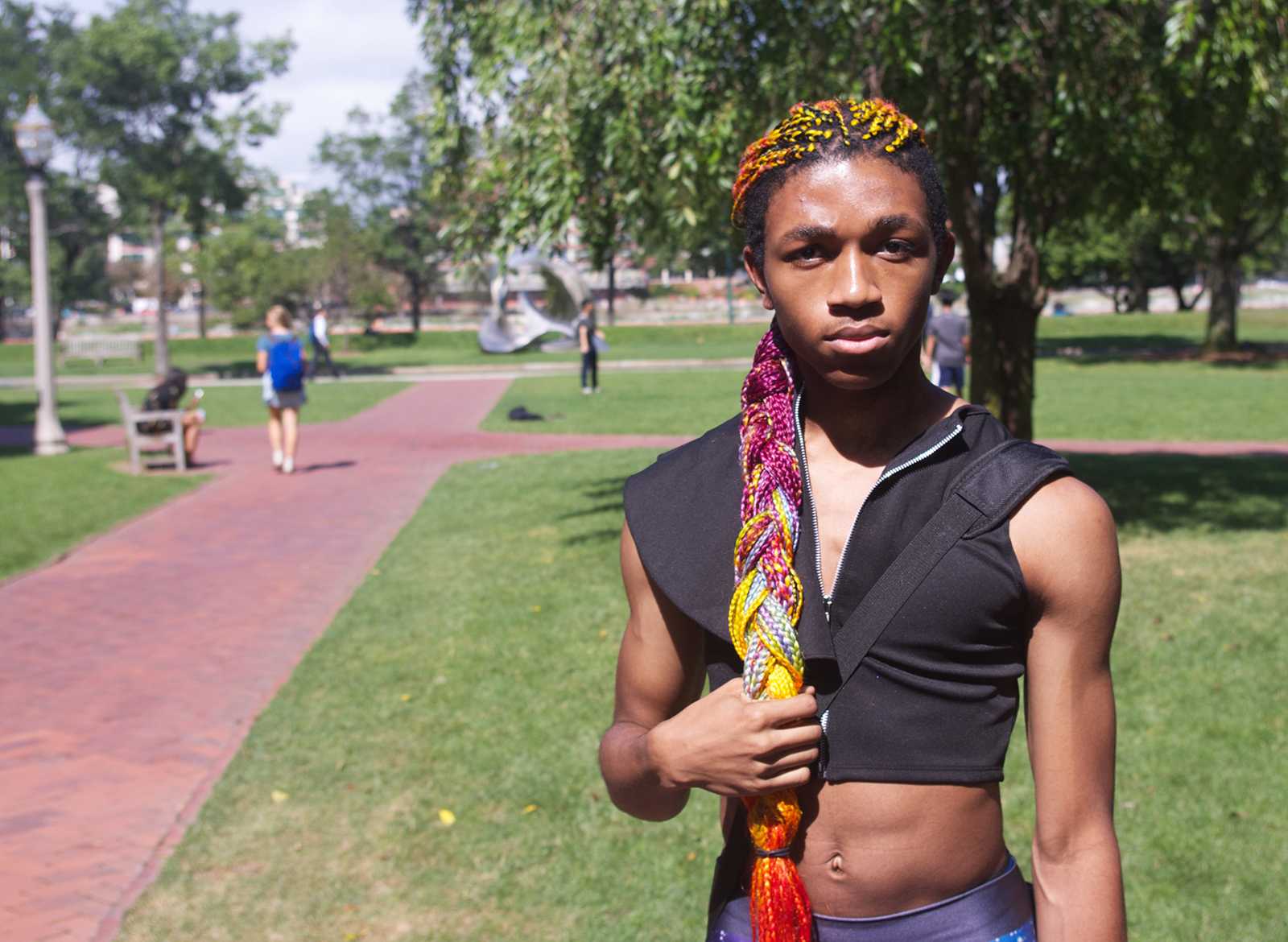
Kailynn Palaima is not returning to Boston University.
The former College of General Studies freshman and Gamma Phi Beta sister owes BU approximately $36,000, money she took out as student loans.
Palaima said she received $16,000 in grants last year, but after her parents’ divorce, they could not co-sign a federal loan big enough to cover her BU tuition.
“My dean and advisors tried everything they could to help me stay in school,” Palaima said. “But BU was unable to adapt to those circumstances, leaving me with a large bill and little help.”
Palaima is not the only one who has experienced financial difficulties. Over this past summer, a group of BU students started the #PoorAtAPrivateUniversity campaign on social media to protest hikes in tuition and to express their frustration with the financial aid process.
The campaign’s Facebook group is a place where approximately 80 students share their personal stories of the often-confusing process that is navigating the financial aid system, Dev Blair, the co-founder of the hashtag campaign, said.
To be able to afford their education at BU, the College of Fine Arts sophomore said, they removed their sports pass, switched health insurance and changed dining plans — all things that “no students should be expected to do in order to continue attendance at BU.”
On Facebook, students exchange what BU President Robert Brown calls “heartbreaking stories” of changing financial situations and the effects it has on their experience at BU.
This hashtag campaign is the first of its kind at BU, said Julie Wickstrom, BU’s director of financial assistance. When she learned about the campaign, Wickstrom said, she reached out to Blair personally because she was “deeply concerned” and happy to hear from the group.
“My main goal, when I hear that students are having a hard time, is to try to find out if it has to do with the process and communication,” Wickstrom said. “I know that [administrators] don’t know everything.”
Blair said they created this group with CFA junior Pamela Munoz to “draw attention to a set of attitudes that [they] faced as low-income students,” and to inform students about tools they can utilize to ease financial stress.
“Once I got in touch with [the financial aid] director, she was very, very helpful,” Blair said. “… We didn’t know there was someone we can talk to about this until we had to appeal. That’s a problem.”
In August, students in the Facebook group drafted a letter to Wickstrom, suggesting several solutions to better students’ experiences dealing with financial stress. Among the suggestions are financial counseling sessions and clearer language in the financial aid policies.
“We definitely started incorporating that kind of feedback into everything that we do,” Wickstrom said. “I’m excited to find an opportunity to learn more and figure out how we can improve our process.”
Wickstrom added that her office offers workshops throughout the year, but students often don’t show up. These workshops discuss things like keeping track of tuition increases and planning around rising costs.
“We really do care about [the students],” she said. “It might seem like a lot of bureaucracy sometimes, but I can’t think of a colleague at BU who doesn’t care about them.”
While the financial aid office is trying to simplify the process and improve student outreach, the university itself has its own financial difficulties, BU spokesperson Colin Riley said.
“There’s a contradiction,” he said. “[Students] feel [tuition] should be less expensive, but at the same time, [they] want something that makes it more expensive.”
One of the more costly demands is the student-to-faculty ratio. Riley said parents, students and ratings organizations view the ratio as an important measure of education quality.
Another factor students often ignore is that BU depends on tuition to operate, Riley said. That means despite the fact that the university had a $1.6 billion endowment in the 2015 fiscal year, endowment only generated less than 3 percent of the university’s operational revenue, while tuition and fees make up 54 percent, he added.
Because BU is tuition dependent, the financial aid packages require that students take on federally funded debt. In the 2015 fiscal year, BU students borrowed a total of $247 million in loans to offset the costs, according to BU President Robert Brown’s letter sent to the university in March.
This year, just under half of the BU Class of 2020 qualified for a share of the $209 million of available need-based aid, Wickstrom said. Forty-two percent of those students will also take out federal loans, according to the U.S. Department of Education.
The loans students take out each year fluctuate depending on how much financial aid they receive. BU financial aid eligibility is calculated by subtracting a student’s Expected Family Contribution and annual educational costs.
The EFC consists of a parental contribution, 25 percent of the student’s accumulated savings and other assets and a minimum contribution from student earnings. Financial aid award packages cannot exceed this amount, according to the BU Financial Assistance office. Federal aid is calculated with a federally legislated formula.
Tuition, mandatory fees and standard room and board for the 2016-17 school year cost $65,110. According to the Department of Education, these figures are well “above average.”
The overall increase in costs for this year shows a 3.7 percent rise in tuition and a 2.4 percent rise in room and board, set by the BU Board of Trustees. According to Brown’s letter, this is lowest percentage increase since the 1992 academic year.
Brown said the price tag hike is attributed to increased salary and benefits for faculty and staff, renovated facilities, government-regulated costs and the academic programming.
Yael Bermudez, a sophomore in CGS, said she wished BU had informed her more about the financial aid process during admission. Two years ago, when she was choosing universities, she wasn’t certain whether BU was for her. But with financial aid, she was able to attend without taking out any loans.
This fall, the situation changed. When her mother got a new job, Bermudez said, she assumed that the approximately $3,000 raise in tuition would be covered by aid, but her $52,000 yearly grant was instead cut by approximately $13,000.
She was able to return to BU this semester.
“It’s really frustrating because you feel like there’s something else that you can do,” Bermudez said. “But you’ve already outed all your other options.”
Jackie Rocheleau, a junior in the College of Arts and Sciences, expressed similar emotions when she found out that her aid was cut by $6,000 this year.
“Here I am two years later and you take away what’s mine,” she wrote in a letter published on Odyssey. “You go back on your word, greedily demanding more … from a family that makes less than you do in a month.”
Her effort to appeal for more aid was successful. BU handled the situation well, she said, but she fears the outcome for other students.
“It breaks any trust you have with the university system,” Rocheleau told The Daily Free Press.
The university is not blind to situations like Palaima’s, Bermudez’s or Rocheleau’s, but some situations go beyond BU’s financial limits, Riley said. Last-minute changes and yearly tuition increases are situations that often put the university in a hard place, he said.
“The school doesn’t have unlimited resources,” Riley said. “The senior administration is focused and concerned for the challenge of affordability, accessibility.”
Riley said higher education institutions across the United States are facing similar difficulties, and BU’s $3,000 tuition rise is smaller than many other peer schools.
“I don’t want to make it sound like [$3,000] is not [a lot of money],” Riley said. “We know it is. We would love to have someone donate a billion dollars just for undergraduate student aid.”
For students struggling with their financial situations, Blair said, they have become a shoulder for others to lean on.
“When I started talking about this, people would come to me,” Blair said. “I have no qualifications to counsel someone about their own financial situation, as much as I would like to be of help. I was like, we need to support each other.”
But even that might be too late for Palaima, now a sophomore at the Bridgewater State University.
“Every student should be able to get an education from a school like BU,” she said. “No matter how much money they have, and what life is like at home.”
Editor-in-Chief. Bostonian by way of Indiana. Excessive Instagrammer. Seltzer addict. Journalism junkie, storytelling fiend.





Maybe go to a public university, then?
I nearly cried after reading this article.
On one hand, I’ve been extraordinarily privileged. I’m cis, white, male, and have benefited from society’s bias toward people like me throughout my life. I’ve been able to address my financial problems in part because of my privilege because people assume I’m capable of handling it.
On the other hand, no one should be forced to work as much as I have (and others I know have) in order to afford BU. I’m a senior now, and I’ve worked every single semester. Since sophomore year, I’ve had to put more than 25 hours per week toward working to fund my education in addition to the 40+ hours per week it takes to be a full-time student. I worked 80 hours per week this summer in order to scrape together enough money for this academic year, where I’m still working 30 ish hours per week to fund my Ph.D program applications, food, tuition, and necessary expenses like textbooks and plane tickets home this winter break. Working has cost me some degree of sanity (leading to suicidal thoughts and the need to go to SARP) and my ability to effectively and fully dedicate myself to my studies.
There needs to be a better way. Students shouldn’t be forced to work themselves to death to afford BU. Being #poorataprivateuniversity shouldn’t suck this much.
At my time at BU in order to stay I had to opt out of housing and sleep on a couch for three years. In addition, my dad depleted his 401k in order to pay tuition. About a year and a half into my college career, my dad lost his job. Towards the end he also got a brain tumor and had to go under surgery.
You would think that any of these situations would allow BU to offer more financial aid, but instead the opposite happened. As tuition increased, the money I received on my grant decreased making it extremely difficult to pay for tuition. It cause me to go part time for a year as my parents recovered from a financial hole and I had to take an extra semester.
I’m lucky that I even graduated from BU and I value my education, even though I think there is a lot of ways to improve it, but in no way did I think BU offered the right help for my situation. Yea it might seem that BU offers “help” but for the most part they seem like cover ups to actually helping the students in need. BU students don’t ask for anything fancy but a good and affordable education, and all BU seems to care about is how they can get as much money as they can out of someone
No big deal to BU, as long as Bobby Brown gets to collect his $1 Million + salary. Nothing but a bunch of selfish scumbags masquerading as intellectuals and change agents. Just read how Ken Elmore describes himself
“Kenn Elmore likes to rock the boat. He looks for improvisation in the conventional and inspiration in the ordinary. Kenn loves keeping things on the cutting edge while still coating everything with spoonfuls of sugar. Temperamentally, he’s an artist, who went to school to study psychology, education, and law.
In his development as an educator and as a human being, and in the search for his hopes and dreams, Kenn has been encouraged, supported, nurtured, and taught by people of all religions, races, and cultures. He was educated in Brooklyn and the City; by folks in rural South Carolina; and, within the Pomfret, Brown, Boston University, and New England Law communities. Kenn’s teachers have been Civil Rights, urban decay, Booker T and the MGs, the digital age, poor folks, Ellison, DJs and B-Boy creators, storytelling, Morrison, Root medicine, and the dozens.
Kenn loves that which is playful, stylish, articulate, highly-referenced, coded, transcendent, lyrical, musical, pop, and political. In his current role, as dean of students at Boston University, Kenn works with the students and staff in that community to plunge young people into an environment full of color, music, and conversation. He tries to play his part to keep Boston, Boston University, and educational environments as places for people to come together, find passion, write poetry, and find love.
He’s the one your parents cautioned you about but with whom you loved to hang out.”
But then he collects his $600,000+ salary each year while students suffer and struggle financially. What a joke! Bourgeios scum…
He’s the only one using that hashtag.
How can you realisticall ask for sympathy? We go to a Private University, one of the best in the land. We make sacrifices but we don’t complain about it we go about our classes and we work our part time jobs. How many jobs does Dev have?